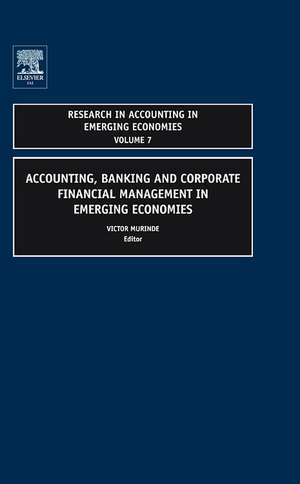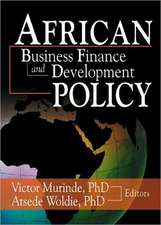Accounting, Banking and Corporate Financial Management in Emerging Economies: Research in Accounting in Emerging Economies
Autor Victor Murindeen Limba Engleză Hardback – 23 noi 2006
Through an increasing awareness of the real issues and the accounting practices advocated in it, these works have become relevant to the actual needs of its readers, and is making real contributions to the accounting development process of emerging economies.
The volumes presented aim to:
*Raise the level of interest in the specific problems of accounting in emerging economies
*Increase awareness of real issues, so that accounting in these countries will not just be seen as a matter of copying what is done in the industrialized countries
*Provides an authoritative overview of the research and progress in this field
Preț: 1204.31 lei
Preț vechi: 1564.04 lei
-23% Nou
Puncte Express: 1806
Preț estimativ în valută:
230.48€ • 239.73$ • 190.27£
230.48€ • 239.73$ • 190.27£
Carte tipărită la comandă
Livrare economică 15-29 aprilie
Preluare comenzi: 021 569.72.76
Specificații
ISBN-13: 9780762313037
ISBN-10: 076231303X
Pagini: 512
Dimensiuni: 155 x 234 x 711 mm
Greutate: 0.89 kg
Ediția:New.
Editura: Emerald Publishing
Seria Research in Accounting in Emerging Economies
ISBN-10: 076231303X
Pagini: 512
Dimensiuni: 155 x 234 x 711 mm
Greutate: 0.89 kg
Ediția:New.
Editura: Emerald Publishing
Seria Research in Accounting in Emerging Economies
Public țintă
Professionals, Researchers and Students in this field.Cuprins
Introduction: Accounting, Banking and Corporate
Financial Management in Emerging Economies.
Theme 1: Accounting and Financial Reporting
Goodwill on Consolidation as an Indicator of Progress in Transition Economies: Evidence from Polish Listed Group Financials Statements. Lending Decisions and Accounting Information: Evidence from Bangladesh.
Quarterly financial Reporting: A Survey of Malaysian Users and Preparers. Post-Colonial Accounting Development and the Nexus of Domestic-Global Interests
in Emerging Economies.
Corporate Mandatory Disclosure by Financial
Institutions in Uganda.
Acceptance of International Accounting
Standard-Setting: Emerging Economies Versus
Developed Countries.
Theme 2: Banking and Microfinance Lending.
The Impact of Capital Requirements on Bank Behaviour: Evidence from Jordan.
Regulatory Intervention and Resolution of Failed Banks in Uganda.
Micro and Small Enterprise Development in Sub-saharan Africa: a Macro Analysis.
Risk Behaviour and Group Formation in
Micrcredit Groups in Eritrea.
Impact of Investment in Information Technology on Bank Productivity and Profitability: Evidence from Jordan.
The Response of Financial Savings to Financial Sector Liberalization.
Impact of Access to Credit on Household Welfare in Rural Vietnam.
The Implications of the ‘One Size Fits All’ Microfinance lending model on Enterprise
Formation and Growth: An Analysis of the Liquidity Problems of Microenterprises.
Theme 3: Corporate Financing and Financial Markets.
Prediction of Corporate Financial Distress: Evidence from Malaysian Listed Firms.
During the Asian Financial Crisis. A Portfolio Approach to Firms’ Financing Decisions: Evidence from India Using the Almost Ideal Demand System.
Selfishness or Co-operation: Trade Credit in Manufacturing Firms in Eritrea.
The Small Firm and Price-Earning Effects: Evidence from African Stock Markets.
Company Financial Structures in Emerging Economies: Evidence from a Comparative Analysis of Thai and Malay Companies. Measuring the Cost of Equity in Frontier Financial Markets.
Financial Management in Emerging Economies.
Theme 1: Accounting and Financial Reporting
Goodwill on Consolidation as an Indicator of Progress in Transition Economies: Evidence from Polish Listed Group Financials Statements. Lending Decisions and Accounting Information: Evidence from Bangladesh.
Quarterly financial Reporting: A Survey of Malaysian Users and Preparers. Post-Colonial Accounting Development and the Nexus of Domestic-Global Interests
in Emerging Economies.
Corporate Mandatory Disclosure by Financial
Institutions in Uganda.
Acceptance of International Accounting
Standard-Setting: Emerging Economies Versus
Developed Countries.
Theme 2: Banking and Microfinance Lending.
The Impact of Capital Requirements on Bank Behaviour: Evidence from Jordan.
Regulatory Intervention and Resolution of Failed Banks in Uganda.
Micro and Small Enterprise Development in Sub-saharan Africa: a Macro Analysis.
Risk Behaviour and Group Formation in
Micrcredit Groups in Eritrea.
Impact of Investment in Information Technology on Bank Productivity and Profitability: Evidence from Jordan.
The Response of Financial Savings to Financial Sector Liberalization.
Impact of Access to Credit on Household Welfare in Rural Vietnam.
The Implications of the ‘One Size Fits All’ Microfinance lending model on Enterprise
Formation and Growth: An Analysis of the Liquidity Problems of Microenterprises.
Theme 3: Corporate Financing and Financial Markets.
Prediction of Corporate Financial Distress: Evidence from Malaysian Listed Firms.
During the Asian Financial Crisis. A Portfolio Approach to Firms’ Financing Decisions: Evidence from India Using the Almost Ideal Demand System.
Selfishness or Co-operation: Trade Credit in Manufacturing Firms in Eritrea.
The Small Firm and Price-Earning Effects: Evidence from African Stock Markets.
Company Financial Structures in Emerging Economies: Evidence from a Comparative Analysis of Thai and Malay Companies. Measuring the Cost of Equity in Frontier Financial Markets.




















